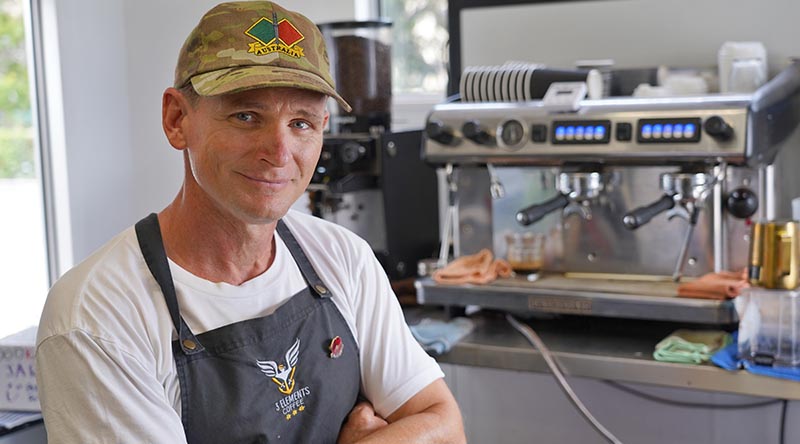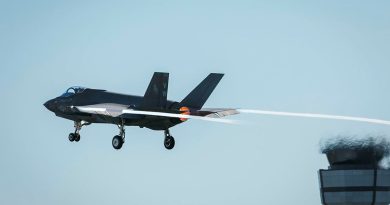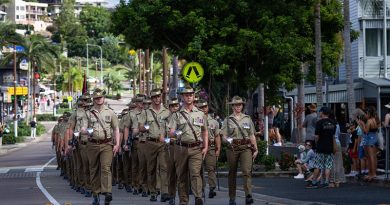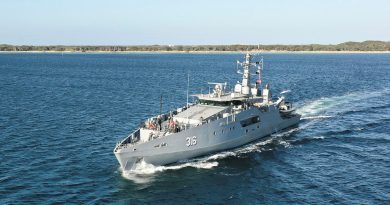Research measured veteran reintegration to civilian life
Share the post "Research measured veteran reintegration to civilian life"

Veterans have a greater chance of successfully transitioning into civilian life thanks to world-first research by the Gallipoli Medical Research Foundation, funded by RSL Queensland.
CAPTION: Tim Thomas, ex commando, now coffee-shop owner – and veteran advisor for a Gallipoli Medical Research Foundation study. Photo supplied.
View/use the M-CARM program here
The six-year Service to Civilian Life study, published recently, unveiled a groundbreaking new tool to measure adjustment after military service – the Military to Civilian Adjustment and Reintegration Measure – or M-CARM.
Gallipoli Medical Research Foundation (GMRF) Associate Director of Mental Health Research and Principal Researcher Dr Madeline Romaniuk said the study aimed to understand why some veterans transitioned to civilian life easily while others struggled, and to use the knowledge to develop methods to support veterans more effectively.
M-CARM is a self-reporting questionnaire that measures a variety of factors associated with successful adjustment to civilian life, including purpose and connection outside the military, resentment or regret about military service and attitudes to seeking help for health difficulties.
The possible retention of problematic military habits and adaptability to change are also measured in the survey.
“For some, the journey from military service to civilian life can be a daunting prospect,” Dr Romaniuk said.
“‘Civvy Street’ may seem at odds with the culture and familiar structure of Defence and can leave some veterans feeling a very real sense of loss – more than just a job, they lose their tribe, their purpose and their identity all at once.
“The psychological toll this takes can be devastating.
“Previously published research from the Departments of Defence and Veterans’ Affairs found that almost half of those transitioning will have a diagnosable mental health condition within the first five years following discharge.”
The Service to Civilian Life study was one of the world’s largest qualitative research projects into the transition process and was funded by RSL Queensland as part of a $14 million commitment to veterans’ mental health research.
RSL Queensland General Manager of Veteran Services Robert Skoda said the GMRF partnership delivered valuable insights for shaping the organisation’s service delivery.
“Understanding the underlying challenges of transition and reintegration, and the effect these have on Defence families, is critical if RSL Queensland is to provide appropriate and effective services,” Mr Skoda said.
“Our partnership with GMRF is a key pillar in our ongoing strategy to ensure a bright future and enduring legacy for all Australian veterans and their families.
“Over the past eight years, we have partnered with them to deliver world-first studies under two key research initiatives, helping us refine the services we deliver and how we deliver them.”
He said that earlier this year, RSL Queensland had confirmed a new five-year partnership with GMRF to conduct comprehensive research into the impact of service on Defence families and expand existing studies into veteran health, transition and reintegration.
“There is limited Australian research into the impact of service on families and how they can successfully address the challenges they face.
“This new initiative aims to build upon our previous research and gain a better understanding of the challenges facing veterans and their families.”
GMRF CEO Miriam Dwyer said she was extremely proud of the enduring and ongoing partnership with RSL Queensland.
“Seeing the positive impact of applying research findings to enhance frontline services is a source of great pride for the entire GMRF team.
“It is a clear demonstration of ‘research in action’,” Ms Dwyer said.
“We have already had international interest in the M-CARM tool from governments supporting veterans returning home, demonstrating the need for such a tool on the international stage” Ms Dwyer said.
CASE STUDY:
Tim Thomas served in Afghanistan and East Timor as an Australian special-forces commando.
Returning to civilian life in 2010 was a struggle for the 47-year-old, after the high pressure and adrenalin-charged tours on the front lines.
“I had it in my head that I would die over there, so when I didn’t and I came home I thought ‘What am I going to do now? I had no formal qualifications and I was used to high stimuli,” Mr Thomas.
“I wasn’t coping well, I kept having problems with workmates and had a lot of family drama.
“There was a lot of pain, a lot of loneliness and I thought about suicide.”
Mr Thomas is a veteran advisor for the GMRF and was involved in the M-CARM research project, saying he, “wanted to contribute and give voice to the silent and unseen struggles of ex-service members”.
“We haven’t been able to measure the success or failure of the transition process till now.
“We are good at turning people into soldiers but not so great at putting them back into the community.
“I see this tool as a critical step for helping veterans who have transitioned from Defence.
“By identifying your needs, you can more easily reach out and ask for help,” he said.
A proud father of two Mr Thomas is now self-employed, running his own coffee-shop business in Brisbane.
View/use the M-CARM program here
.
.
.
.
.
.

.
.
Share the post "Research measured veteran reintegration to civilian life"





